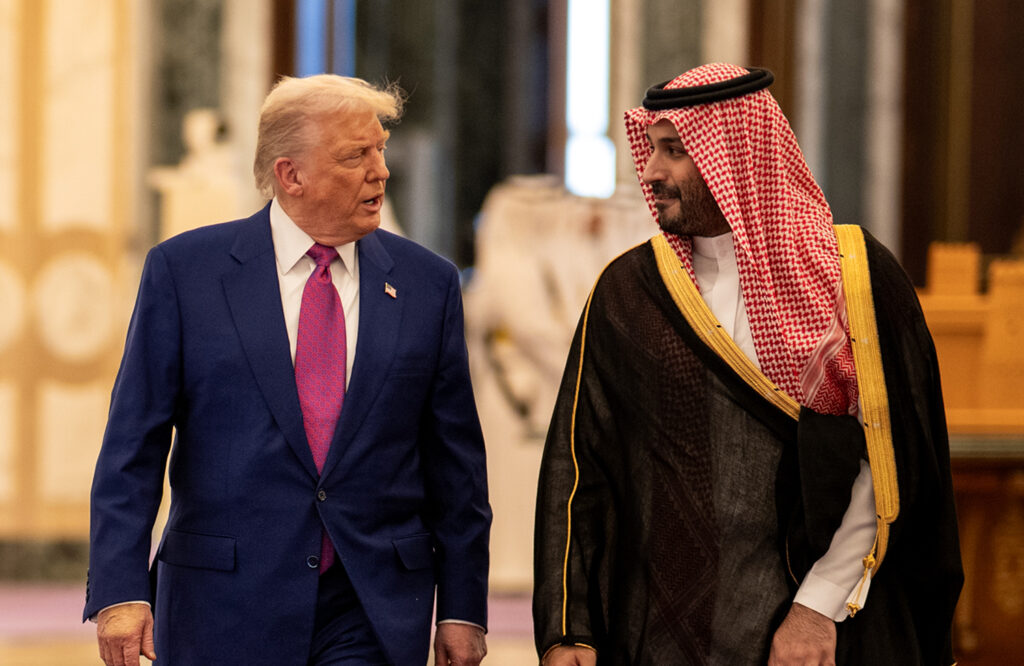Trusting Trump
By Larry Gordon
We cannot blame Donald Trump for not trying to put things in order here in the U.S. as well as internationally. It looks and sounds like he has a handle on an array of issues and who knows? Maybe he will be able to accomplish some of his highly ambitious plans. So far one thing is for certain: none of what he has set out to do will be easy to accomplish.
Almost every president has tried his hand at moving the pieces around the Middle Eastern chess board so as to achieve that elusive state of peace, an objective which has been long in the making.
Trump was in the Middle East this week to try his hand at accomplishing that which has always been seen to be impossible: a deal for regional stability. Whether he is looking to secure an arms deal or investments in the United States, or whether he has larger ambitions of neutralizing Iran’s nuclear program by securing nuclear and political agreements, his plans are always ambitious. However, due to the erratic nature of Trump’s administration and internal disagreements among his key advisors, this trip could just as easily set the stage for a war with Iran as it could for signing a nuclear agreement.
For the next few days, critics on both sides of the aisle will be yelling and screaming at each other over the perceived success or failure of Trump’s trip, where it has been reported that he laid out a roadmap to a “bright future” for the Middle East, a vision that looks like or at least slightly resembles real peace, a vision that Trump dubs a “Golden Age of the Middle East.”
There’s a great deal going on here and it will all be emphatically supported or disagreed about going forward. The reality is that there are short-term goals here as well as long-term goals that make it possible for the short-term objectives to be achieved.
Those on the left and the right who are seeking to undermine Trump regardless of where he stands and the policies he pursues will claim that after all is said and done, Trump is turning on Israel. The subsidiary claim here is that Prime Minister Netanyahu is no longer effective or successful and the groundwork should be laid to facilitate the emergence of the next leader of Israel.
If that is true, then that conceivably means that Trump and Senate Minority Leader Chuck Schumer are on the same side and agree that Bibi has to go. But the Democrats, as leaderless and disorganized as they are, cannot afford to be on the same side of any issue as President Trump, which means they may have to switch positions and support Netanyahu’s leadership.
But there is far more at play here. The common belief for all these years has been that peace and regional cooperation between Israel and her Arab neighbors cannot move forward unless the Israelis agree to the creation of a Palestinian State. But if President Trump is going to achieve a breakthrough that expands the Abraham Accords to include Saudi Arabia and possibly even Qatar and Lebanon, the way around the Palestinian State problem will be in the language that is agreed to by all parties—especially Israel.
The Saudis, who are the key players in this equation, are no longer insisting that the establishment of a Palestinian State is required prior to establishing diplomatic relations with Israel. The Saudis want assurances from the U.S. that there will be a “pathway” to the creation of such a state.
And that is why PA president, Mahmoud Abbas, now serving his 20th year of a four-year term, will also be present for a meeting with Mr. Trump in Riyadh this week. Abbas will be 90 years old in November and there is no heir apparent or much of a future for his Palestinian Authority. They subsist solely through the facilitation of Israel and in part the U.S. Trump should hopefully be able to tell Abbas eyeball-to-eyeball that he wants the Abraham Accords expanded, and he wants the Palestinians to stay out of the way.
The President probably wants Abbas to say that there has been new ground broken on the possibility of a future Palestinian State without going into too much detail. Down the road and after the expanded Abraham Accords are the main attraction, Israel and Palestinian negotiators will meet again. Abbas and his associates will demand a division of Jerusalem and the evacuation of all Jews from Judea and Samaria.
Most involved in the process know that this will never happen, but we need to be mindful of the fact that the requirement is that there be a “pathway” and not necessarily anything more. No one involved is even dreaming about the arrival of a conclusion to the long-referred to “peace process.”
Just a week or so past the anticipated milestone of the new administration’s first 100 days in office, it is abundantly clear that President Trump has reached his full stride in pursuing his campaign promises and the three main goals of his second term in office.
Aside from the news emanating from the Middle East this week, it is expected that direct negotiations between Russia and Ukraine will get underway and will be preceded by an at least temporary ceasefire. Also, this week there has been marked progress in the trade and tariff stand-off with China—news that is also earth-shattering.
Earlier this week, the president signed an executive order mandating that drug prices be reduced 30–80%. In other words, this looks like we are at the beginning of the true Trump plans coming to fruition.
I’m hopeful that Hamas’s release of Edan Alexander is not just an indication of a gesture to Trump so as to curry favor with the new president. The hope is that this is the first step in the direction of the release of the remainder of the hostages, both living and otherwise.
At the same time, it is true that the uptick and increase in Israel’s military presence in Gaza has created serious additional pressure on Hamas to not just release the last remaining hostage with U.S. citizenship, but also a prelude to the end of the war and the release of the remaining hostages.
Trump is hitting his stride, and while matters are still very much evolving in multiple directions, it is (at this point anyway) interesting to watch those who were anti-Trump at the beginning experiencing a sort of epiphany or perhaps even a conversion only after the president was elected. (Can you imagine that some of those outspoken voices thought we’d be better off with Kamala and Tim?)
So now we are in a situation where even those latecomers who first criticized Trump and only later became supporters are essentially experiencing an emotional snapback and once again questioning his plans and objectives.
Of course, there are questions about Qatar bailing out Steve Witkoff by taking a building off his hands in Manhattan that was sloshing money to the tune of $700 million. Then there are the ongoing real estate deals between the Saudis and presidential son-in-law, Jared Kushner.
The idea of opening economic and diplomatic relations between the smaller Gulf States and Israel while creating a low simmer on the Palestinian issue is indeed the way to go towards a more stable Middle East.
Rest assured that Donald Trump has not lost sight of his long-held vision for the region. During the campaign, you may recall, Trump said that in his estimation, any Jew that votes for Harris-Waltz or any Democrat should have his head examined. Those were his words. Of course, despite his vast experience, I don’t think the president has a clear vision about how nuanced the American Jewish community really is.
And more than anything, as they say, the relationship between Israel and the U.S. is ironclad. My hunch is that this week, normalizing relations between Israel, the Saudis, the Emiratis, and the Qataris and perhaps even Lebanon via a Riyadh-Jerusalem peace deal could go a long way toward thawing out Arab-Israel relations. At the same time, Abbas is being shopped into the meeting with the understanding that if he gets in the way with his incendiary anti-Israel rhetoric, he will be further marginalized and can forget about even dreaming of a Palestinian state—should it be possible sometime in the future in another era.
Think back to the Obama years. Think about when Biden refused to see Netanyahu in the White House. And try to recall when Kamala suddenly had another speaking engagement elsewhere when Bibi was scheduled to speak to the U.S. Congress.
Is that what you prefer? Are these the leaders that we supporters of Israel should have to deal with? Of course not. Just sit back and trust Trump. n
Read more of Larry Gordon’s articles at 5TJT.com. Follow 5 Towns Jewish Times on Facebook, Instagram, and Twitter for updates and live videos. Comments, questions, and suggestions are welcome at 5TJT.com and on Facebook, Instagram, and Twitter.















